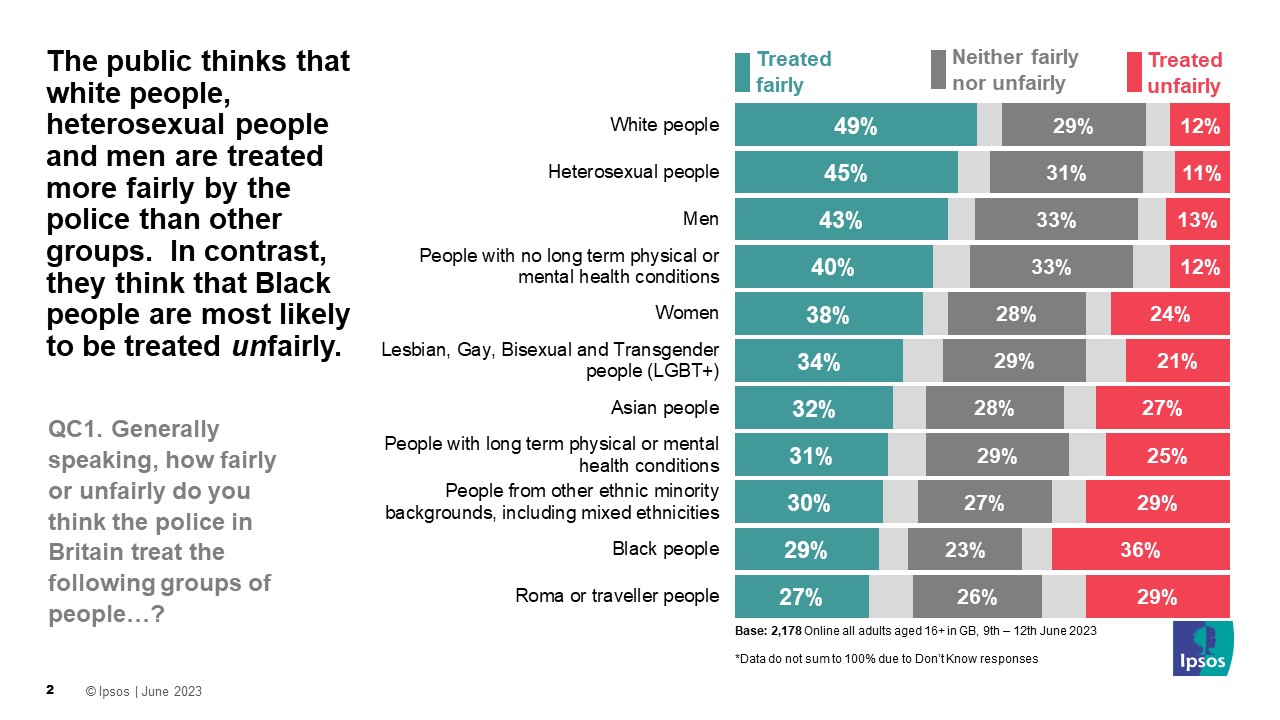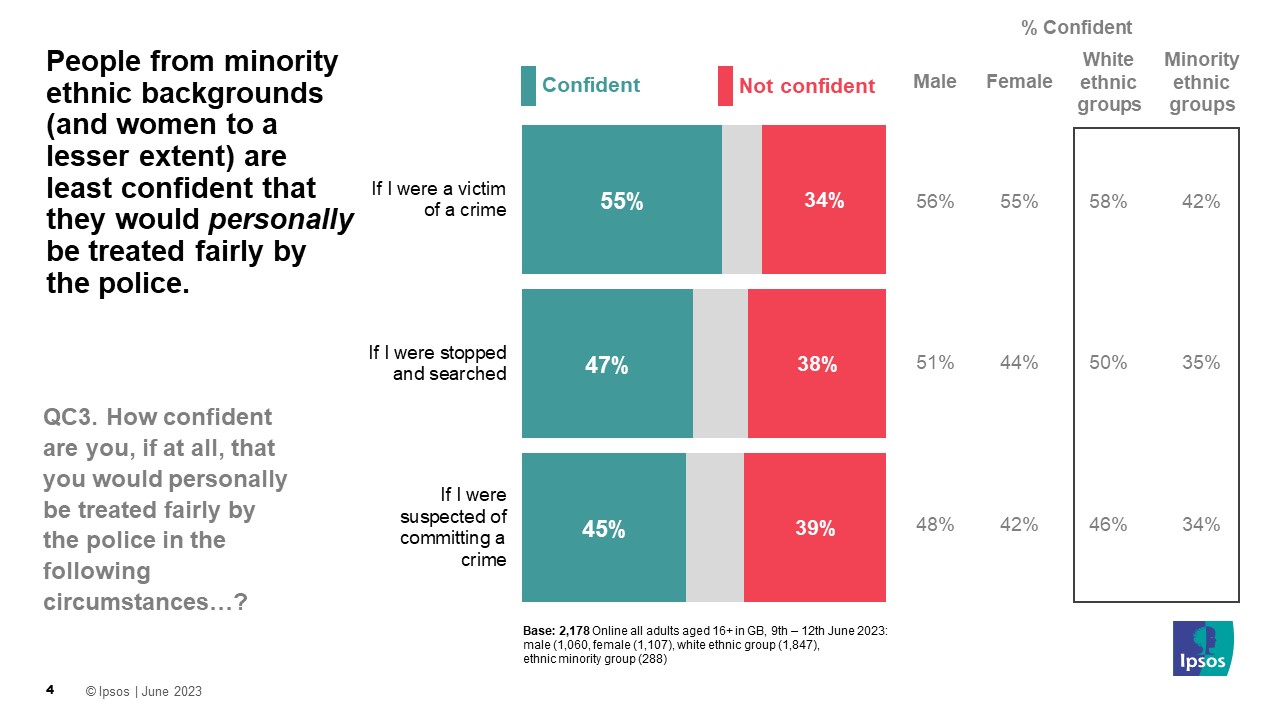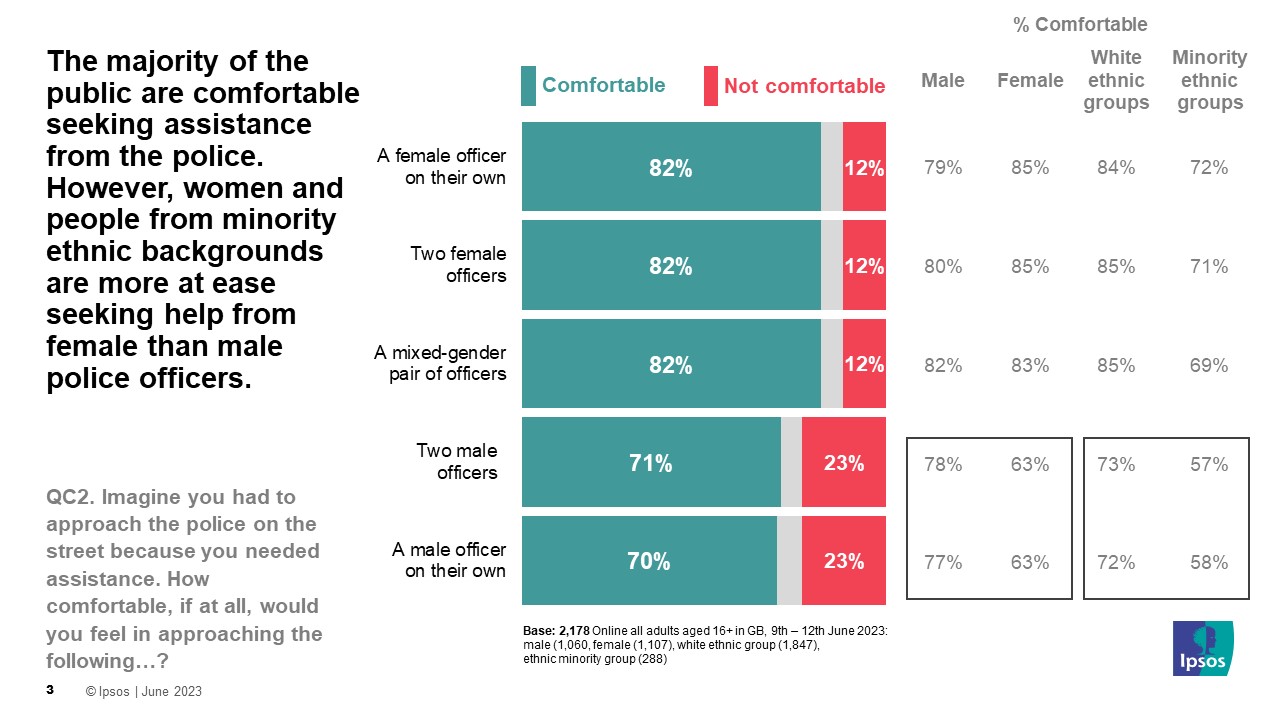More than 1 in 3 believe Black people are treated unfairly by the police
- More than 1 in 3 Britons (36%) believe Black people are treated unfairly by the police – highest of all groups surveyed
- The public is divided as to whether they themselves are confident they would be treated fairly by the police in a range of circumstances, with only 55% confident they’d be treated fairly even if they were a victim of a crime
- People from minority ethnic groups are less confident than white people that they would receive fair treatment from police, whether they were the victim of a crime (42% vs 58%), stopped and searched (35% vs 50%), or suspected of committing a crime (34% vs 46%)
- Despite perceptions of inequalities, the majority of Britons from all backgrounds are comfortable approaching police officers for assistance – though slightly less so if the officer(s) are all male.
New polling from Ipsos shows there’s a lack of confidence in the extent to which Britons are treated fairly by police. The largest share of Britons consider people from white backgrounds (49%), heterosexual people (45%), and men (43%) to be treated fairly by police. By contrast, those from minority groups fall to the bottom of the table, with only 3 in 10 considering people from other minority backgrounds (including mixed ethnicities; 30%), people from Black backgrounds (29%), and Roma or traveller people (27%) to be treated fairly. People from Black backgrounds are the only group to have a larger share of the public consider them to be treated unfairly (36%) than consider them to be treated fairly (29%).

When asked about how they themselves might be treated by the police, half of Britons (55%) are confident that they would be treated fairly if they were a victim of crime, falling to 42% of those from minority ethnic groups. Those from minority ethnic groups were similarly less confident of fair treatment by the police if they were suspected of committing a crime (34% vs. 46% of respondents from white backgrounds) or if they were stopped and searched (35% vs. 50%).

Under half (47%) of people from minority ethnic groups are confident the police would treat them the same as anyone else if they reported a crime, compared with two thirds (65%) overall. People from minority ethnic backgrounds are also less confident than white people that they would be treated with respect (51% vs 64%), listened to and believed (43% vs 59%), and that the police would be clear with them on what would happen next (47% vs 58%).
Despite lack of confidence in fair treatment, the majority of the public are comfortable approaching the police – though less so if officers are all male
Despite some scepticism about how fairly Britons expect to be treated by police, there’s a high level of reported comfort approaching police officers for help, though slightly less so if the officer(s) are exclusively male. Over 8 in 10 (82%) said they would feel comfortable approaching a female officer on their own, two female officers (82%), or a mixed gender pair of officers (82%). By contrast, 7 in 10 said they would be comfortable approaching two male officers (71%) or a male officer on their own (70%).
However, people from minority ethnic groups were less likely than those from white backgrounds to say they would feel comfortable approaching the police in any of these configurations, a gap that is particularly stark when comparing comfort with approaching male officers. Fewer than 3 in 5 from minority ethnic groups said they would be comfortable approaching two male officers (57%, -16ppts compared to respondents from a while background) or a male officer on their own (58%, -14ppts compared to respondents from a white background). Women were similarly far less comfortable approaching male officers as compared to men, regardless of whether it’s two men together (63%, vs 78% of men) or one male officer on their own (63%, vs 77% of men).

Trinh Tu, Managing Director of Public Affairs at Ipsos, said:
In light of recent revelations of a new suspect in the racist murder of Stephen Lawrence, the spotlight is again focused on how the police treats different groups in our society. These findings suggest the police still have some way to go in gaining the confidence of the public and in particular people from minority ethnic backgrounds who feel less confident that they will receive equal treatment as either victim or suspect, and are less likely to feel comfortable approaching the police for help. The public as a whole also identifies people from minority ethnic groups – particularly Black people – as being less likely to be treated fairly by the police.
Technical note:
Ipsos interviewed a representative quota sample of 2,178 adults aged 16+ in Great Britain. Interviews took place on the online Omnibus between 9th-12th June 2023. Data has been weighted to the known offline population proportions. All polls are subject to a wide range of potential sources of errors.



